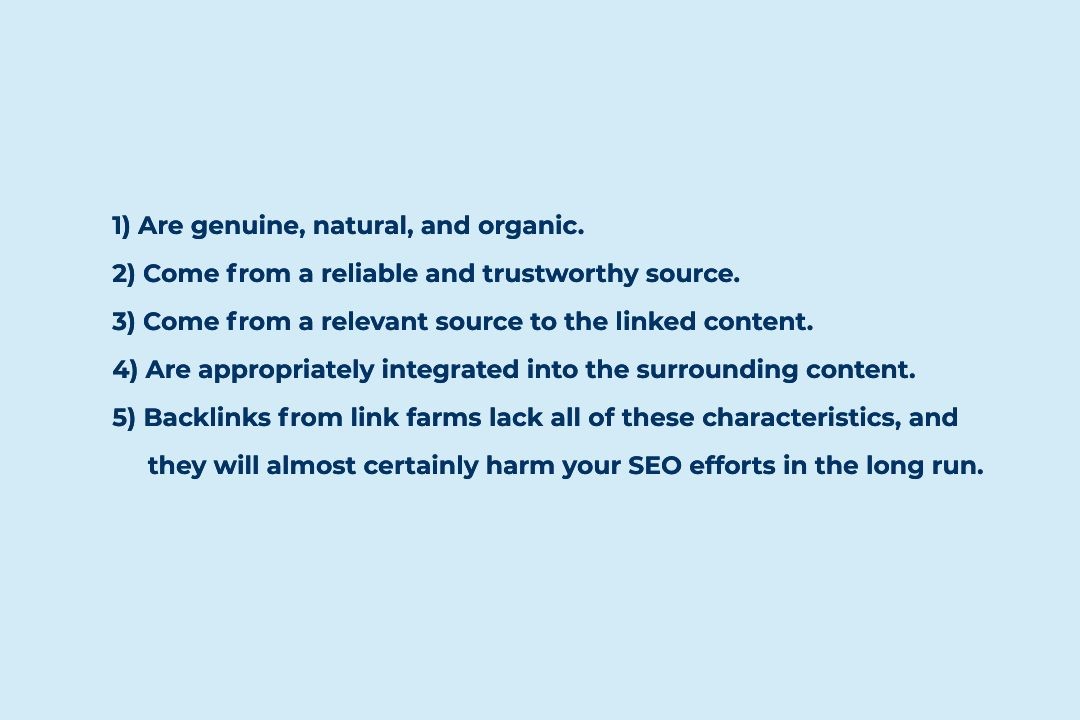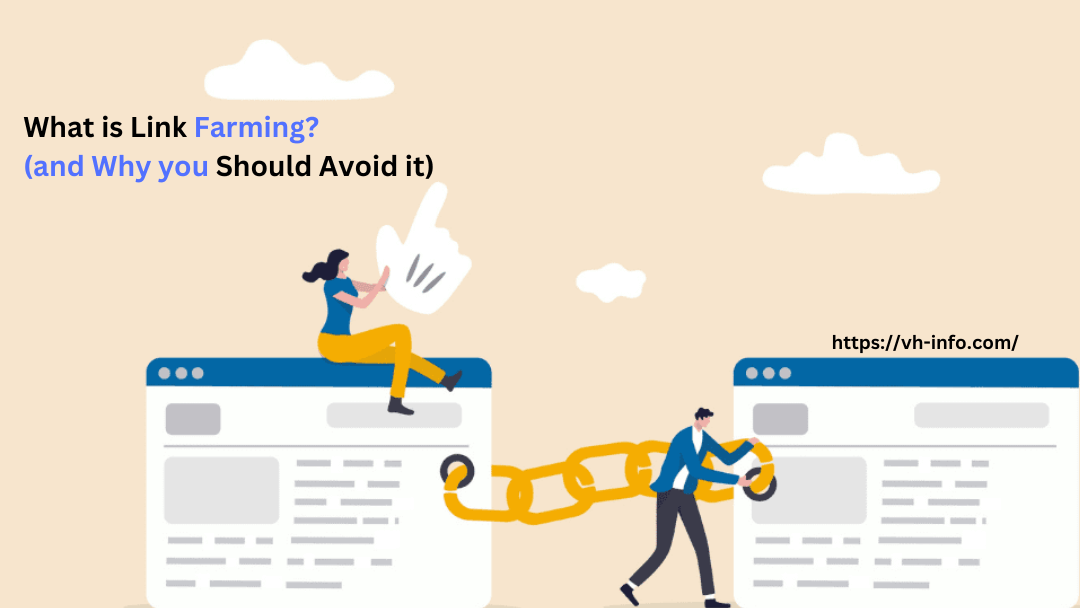Every website owner is now aware of the significance of link building for ongoing SEO efforts.
Search engines use backlinks as important signals to determine the value of your website. They serve as evidence that visitors to your website not only read your information but also find it valuable enough to link to it and share it with others.
But Google and the other search engines are developing greater intelligence. They are aware of the distinction between an organic backlink that was actually acquired and a shortcut with no real benefit.
One of the more dubious strategies marketers occasionally still employ to quickly assemble a large backlink collection is the usage of link farms. However, link farming ultimately causes much more harm than benefit.
Read the following paragraphs carefully to learn more about this.
Link farming: What is it?
A link farm, like a real farm, is a website (or sometimes a group of them) that exists solely to create links to other websites.
Link farms aren’t there to spread a message or provide valuable content to the general public.
Instead, they are sham sites created specifically to add to the backlink catalogs of legitimate websites.
When you see all those services promising to help aspiring website owners and marketers get stellar search engine rankings, hundreds of backlinks, and dozens of pieces of content, think twice before signing up.
All of that “value” cannot exist in a vacuum. In reality, you’re potentially involving yourself with a link farm, putting your site’s long-term success at risk.
Link farming is now considered a deceptive, black hat tactic for artificially increasing page rank, a major no-no in Google’s eyes.
Furthermore, participation in a link farm now carries heavy ranking penalties that can be difficult to overcome, so it’s best to avoid them entirely.
How to Identify a Link Farm?
While some link farms are easier to spot, others appear to be legitimate websites at first glance.
However, closer inspection always exposes them for what they are.
Look for the following characteristics to determine whether a website you’ve found is actually a link farm in disguise:
- A low Google PageRank score — Google-backed evidence that the site isn’t valued.
- Content that is extremely brief or poorly written, with little value to human readers.
- Topics that appear to be random and unrelated were covered.
- Pages are nothing more than lists of links with no context.
- Domain names that make no sense or are made up entirely of random letters and numbers.
- The more of those characteristics you notice, the more likely you’re looking at a link farm.
Legitimate websites have a consistent look and feel. Even if the sites themselves aren’t very well-run, they make sense and you can tell what the owners are trying to accomplish.
Is a Link Farm a PBN?
A link farm is not the same as a Private Blog Network ( PBN), but it could be a component of one.
PBNs are networks of sites used by people to gain authority over other sites they own. The idea is that this will elevate them in the search results.
It makes no sense for a PBN owner to sell backlinks through their network. This would expose it to Google’s scrutiny.
However, a PBN operator may extract additional revenue from sites by using some of them as link farms if:
Google has already discovered the PBN, and the sites aren’t passing on any positive rank to the network.
Why Does Google Hate Link Farming?
Link farms first appeared as a result of Google’s ranking algorithm, PageRank.
In the early days of PageRank, each link to a specific website was regarded as a vote for that site’s overall worth and popularity.
The more backlinks a site had, the more valuable it was thought to be, and there was little way to distinguish between genuine backlinks and fake ones created to manipulate the algorithm..
However, as the algorithm evolved and Google became smarter, steps were taken to identify link farms and prevent them from dominating SERPs.
As a result, owning, operating, or even being associated with a link farming scheme can now result in penalties from Google and the other search engines, and for good reason.
Link farms purposefully try to fool Google’s algorithm in order to achieve artificial rankings for sites that haven’t earned them.
Is Link Farming Worth the Risk?
Although link farming may appear to make sense on the surface, especially after hearing a slick sales pitch from a black hat SEO “expert,” it is not worth the risk.
The following are just a few of the numerous reasons why you should avoid them at all costs.
You can’t trust the quality
Although link farming may appear to make sense on the surface, particularly after hearing a slick sales pitch from a black hat SEO “expert,” the risk is not worth it.
Here are a few of the many reasons why you should avoid them at all costs.

You can’t trust the longevity
Even if the link farm’s owner runs a tight enough fleet to avoid being shut down or penalized, there is no guarantee that those links will remain active in the long run.
Link farms frequently fail just as quickly and abruptly as they rise, which means that all of the backlinks you paid for may simply vanish.
Even if the link farm remains active, there are no guarantees that your specific links will not be removed or otherwise changed without notice.
So it’s only a matter of time before farmed links become completely useless.
You may face severe penalties.
Poor quality links, such as those associated with link farms, expose your site to severe penalties that will be difficult to overcome.
This applies to both outbound links in your content and backlinks pointing to your site.
The penalties are frequently applied automatically by an algorithm filter. Members of Google’s spam team, on the other hand, occasionally manually review sites for potential violations of their webmaster guidelines and decide to use a penalty.
How to Know If Your Link Building Service Uses Link Farms
To develop links for clients, certain link-building firms are involved in link farming.
They do this because they can avoid spending time and money on the actual link-building process, which involves producing high-quality content and conducting manual outreach.
Instead, they can simply use link farms they either own or are affiliated with to place backlinks to boost their DA.
It’s an easy victory for the link builder, but the clients’ money is completely wasted.
The problem is that it might be challenging to predict the websites that backlink-building services would use to establish links. The following red flags should cause you to pause:
- Guaranteed links: There are no assurances when building links; it is up to website owners to choose whether or not to do so. A link farm may be used by a provider if it guarantees links on a specific type of website or website.
- Quick links: It takes time to create backlinks. You need to locate appropriate websites, bargain with the owners, and then provide pertinent material. Watch out for services that guarantee quick outcomes.
- Low cost: Link building is an expensive procedure. Writing guest pieces and doing manual outreach can be costly. Service may be taking shortcuts to building links if the pricing is suspiciously cheap.
- Poor performance: Link farms are ineffective. If the service cannot provide detailed testimonials or case studies demonstrating how it has influenced a site’s search engine ranking, this is a major red flag.
What Should You Do Instead of Link Farming?.
Link farming may appear to be a quick way to achieve your desired level of SEO performance, but it just doesn’t work in the long run.
Making the appropriate optimization decisions and running your website ethically are the only ways to achieve long-term success. Here are some pointers to help you get going.
1. Examine your link options carefully
Make a special effort to make sure the website you are connecting to is trustworthy when choosing outbound links to include in your content.
Pick websites and materials that are related to your own. Verify their applicability, reliability, and ranking.
To your audience, an outbound link is a recommendation from you. Choose carefully.
Remember that if they’re selling links to you, they’re probably also selling them to a lot of other people, which means you’re dealing with a link farm.
2. Understand the differences between link farms and directories
A link farm and a directory could appear to be the same thing at first glance. They are, however, extremely dissimilar.
While link farms are random, directories are well-organized and carefully managed. In comparison, link farms don’t truly offer their visitors any kind of helpful service.
Your SEO efforts and SERP rankings will benefit greatly from directories. Simply carefully consider your alternatives to make sure you are included in the best, most pertinent ones for your industry or area.
3. Concentrate on gaining organic links
There’s nothing wrong with asking for or exchanging links with credible competitors in your niche, but completely natural connections are still preferable.
And the best approach to achieve those is to concentrate on accumulating a library of expertly created, educational content that actually benefits the people who visit your website.
Analyze a range of topics associated with your area of expertise as well as other media. Answer the inquiries from your audience from different perspectives.
It goes without saying that this approach won’t produce a sizable collection of backlinks overnight, but it is still the best and most efficient way to get results that last.
Conclusion: Keep updated with trends and achieve success
Neither Google nor your audience remains the same over time.
Then your SEO approach also can’t be static if you’re serious about remaining ahead of the competition. This entails keeping up with new developments in SEO, marketing, and changing consumer demands.
To help you rise to the top of Google’s search engine results pages, you’ll learn how to better optimize your website and produce engaging interactive content experiences, among other things.
Writer Information
Bharat Baghel
Bharat Baghel is a Digital Marketing Expert and also a SAAS content marketer. He loves to talk about SEO, content creation and Digital marketing tactics. In his free time, he likes to read and stay updated on digital marketing trends and travel to remote places on his bike. You can always reach out to Bharat on LinkedIn.



